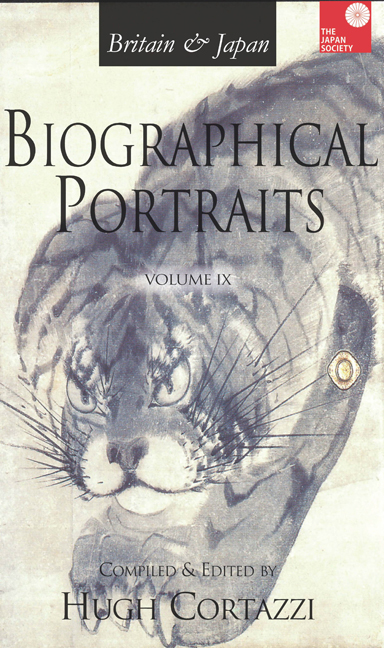Book contents
- Frontmatter
- Contents
- Introduction
- List of Contributors
- Index of Biographical Portraits in Japan Society Volumes
- PART I JAPAN IN BRITAIN: THINGS JAPANESE
- PART II BRITAIN IN JAPAN: TRADE
- BRITISH ACTIVITIES
- MISSIONARIES
- MUSIC, DRAMA AND FILM
- EPISODE
- PAINTERS
- JOURNALISTS
- JAPANESE WOMEN PIONEERS
- PART III SCHOLARS AND WRITERS: JAPANESE
- BRITISH
- PART IV POLITICIANS AND OFFICIALS: JAPANESE
- BRITISH OFFICERS
- BRITISH JUDGES AND A DIPLOMAT
- BRITISH POLITICAL FIGURES
- Index
38 - Edward Divers (1837–1912) and Robert William Atkinson (1850–1929): Influential Teachers of Chemistry in Meiji Japan
Published online by Cambridge University Press: 30 April 2022
- Frontmatter
- Contents
- Introduction
- List of Contributors
- Index of Biographical Portraits in Japan Society Volumes
- PART I JAPAN IN BRITAIN: THINGS JAPANESE
- PART II BRITAIN IN JAPAN: TRADE
- BRITISH ACTIVITIES
- MISSIONARIES
- MUSIC, DRAMA AND FILM
- EPISODE
- PAINTERS
- JOURNALISTS
- JAPANESE WOMEN PIONEERS
- PART III SCHOLARS AND WRITERS: JAPANESE
- BRITISH
- PART IV POLITICIANS AND OFFICIALS: JAPANESE
- BRITISH OFFICERS
- BRITISH JUDGES AND A DIPLOMAT
- BRITISH POLITICAL FIGURES
- Index
Summary
INTRODUCTION: BRITISH CHEMISTS IN JAPAN
EDUCATION IN WESTERN science at the tertiary level was an integral part of the industrialization policy of the Meiji government. Chemistry was widely regarded by Europeans and Japanese in the nineteenth century as the most practical and utilitarian of all scientific disciplines. This subject was therefore well represented in the teaching at both the Imperial College of Engineering, Tokyo (Kōgakuryō.or Kōbu Daigakkō.), and Tokyo Kaisei Gakkō (one of the antecedent schools of Tokyo University). They were both established in 1873 and were the two flagship institutions of early Meiji higher education. The National (Komaba) College of Agriculture, which opened in Naitō Shinjuku in 1877 and moved to Komaba in 1878, also attached importance to the study of chemistry. Despite the long-lasting image of German science as being the model for Japanese science from the Meiji period onwards, British and American teachers were dominant in Japanese higher education between the 1860s and 1880s, and many Japanese overseas students went to British and American universities and colleges to finish their training during this period. German presence in Japanese higher education (and in politics and administration) increased from the 1880s onward. In early Meiji, German influence had been largely confined to medical sciences as Dutch-style medical education, the strongest speciality of Dutch learning in Japan in the Tokugawa period, had been germanized in the early 1870s.
Edward Divers and Robert William Atkinson were two of the most influential teachers of pure and applied chemistry in Meiji Japan. Divers, one of the major advocates of pure chemistry, taught at the Imperial College of Engineering, while Atkinson, who trained a sizeable number of Japanese industrial chemists, taught at the Tokyo Kaisei Gakkō and Tokyo University. Divers and Atkinson belonged to different generations of British chemists.
DIVERS AND ATKINSON's BACKGROUNDS
Edward Divers was born in Newington, Surrey on 27 November 1837. His parents were Frederick Divers and Lucy Divers, née Chambers. Frederick's occupation was recorded as ‘mariner’ on Edward's birth certificate and ‘spirit merchant’ in his marriage certificate. It is unlikely that Divers could expect financial help from his family towards his academic education and he would have to earn his living.
- Type
- Chapter
- Information
- Britain & Japan Biographical Portraits Vol IX , pp. 439 - 450Publisher: Amsterdam University PressPrint publication year: 2015



